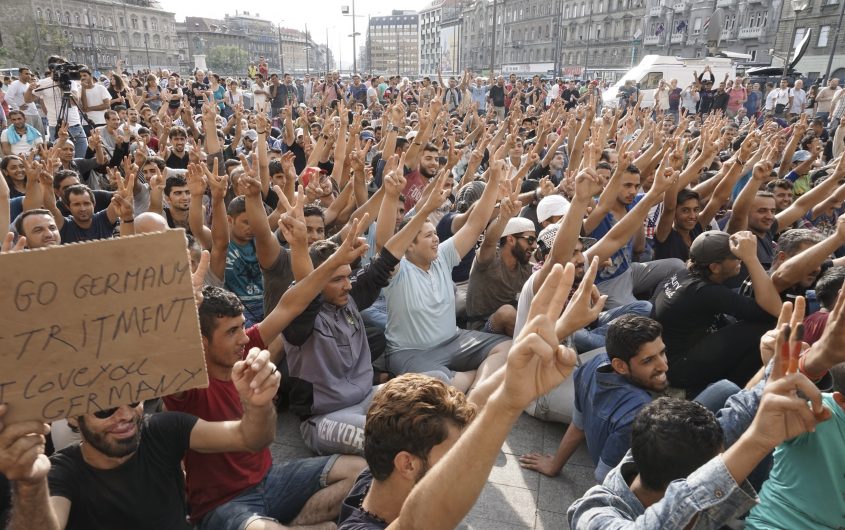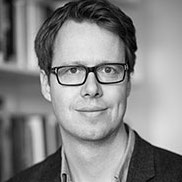
Mstyslav Chernov via Wikimedia Commons
Back to Basics: Call for a Transatlantic Discussion on the Value of Migration and Democracy

Felix Berenskötter
Senior Lecturer in International Relations, SOAS, University of London
Felix Berenskötter was a Visiting Fellow at AICGS in June 2019. He is Senior Lecturer (Associate Professor) in International Relations at SOAS, University of London. He specializes in international theory; concepts of friendship, identity, power, security, peace, space, and time; European security; and transatlantic relations. Following undergraduate studies in Hamburg, Felix received a Masters Degree from Rutgers University, where he was a Fulbright Scholar, and a PhD from the London School of Economics and Political Science (LSE). He authored a number of journal articles and, most recently, edited “Concepts in World Politics” (Sage, 2016). From 2017-2019 he received funding from the Leverhulme Trust for a project on friendship and estrangement in international relations.
He was a 2017-2018 participant in AICGS’ project “A German-American Dialogue of the Next Generation: Global Responsibility, Joint Engagement,” sponsored by the Transatlantik-Programm der Bundesrepublik Deutschland aus Mitteln des European Recovery Program (ERP) des Bundesministeriums für Wirtschaft und Energie (BMWi).
Transatlantic estrangement has been going on for a while. And while it hurts Atlanticists, there is no point in trying and to “repair” U.S.-German relations for the sake of it. What is needed is a shared project that societal actors and governments on both sides want to invest in. This is done by identifying shared fundamental problems and making a commitment to solve them together, generating joint, long-term investment that builds a shared future. Here, I am not thinking of seemingly concrete tasks such as “let’s make sure Iran does not get a nuclear weapon” or “how can we support the Paris Agreement.” It is unlikely that these will become fruitful areas of U.S.-German cooperation in the near future, not least because of the volatility and peculiar strategic thinking of the Trump administration. In fact, I think—and I feel strange saying this as a scholar of international relations—the shared project is not to be found in foreign policy and ideas of world order. Rather, it is found in the basic question what kind of societies Americans and Germans want to live in. In this respect, I see two fundamental challenges.
First, there is anxiety in both societies about “who we are,” or who we will be in the future. Questions about the parameters of national identity and disagreements over the answer are a central part of politics. Political leaders/parties have always offered their particular national narratives. To ensure that the loudest answer is not simply imposed from the top, it is important that civil society engages this debate. On some issues this is already happening, and perhaps more than before. Yet one area where collaboration between American and German civil society could be more fruitful is the story about how the movement of people and, as such, migration affects our respective societies. To be sure, some collaboration is already taking place. Civil society groups questioning the value of multiculturalism, emphasizing exclusion and tapping into xenophobia, have created potent networks across the Atlantic and are promoting their stories about the alleged dangers posed by open borders and immigrants. I think it is important for this imagery to be countered by American and German civil society organizations that can tell a positive story of migration as normal, as integral and beneficial to both societies. It almost seems trivial to say, but there is an abundance of experiences of successful integration and the benefits of multiculturalism on either side of the Atlantic. And right now, we need to exploit this potential and jointly tell and amplify such positive stories for a wide audience.
One area where collaboration between American and German civil society could be more fruitful is the story about how the movement of people and, as such, migration affects our respective societies.
Second, we need to take seriously doubts about and distrust of liberal democracy. Generally understood as a core “Western” value and an achievement, American and German governments and intellectuals have long invested in promoting democracy abroad, confident of their own socio-political order as a shining example. Yet we have been complacent. Disregard for liberal democratic values by state actors and private companies has been exposed in practices of torture, police brutality, violation of privacy, corruption, deception, and various forms of discrimination. (Perhaps we should listen when others call “hypocrisy.”) Granted, human beings are not perfect, and we might say that the strength of a system is measured by how it deals with violations. However, on both sides of the Atlantic we are currently witnessing a significant amount of distrust in, and disillusionment with, democracy as a political system and a process, established political parties and representatives elected into office. Long accepted and ignored as “political apathy” or Politikverdrossenheit, these feelings now find expression in anti-establishment figures and social movements emerging, operating, and proudly presenting themselves as outside the established political system. Perhaps this is another form of Außerparlamentarische Opposition (fifty years on it is tempting to make the comparison); my guess is that both leaders and followers still consider their forms of raising their voice as an exercise of democratic citizenship. It certainly should prompt us all to reflect on and debate the forms, functions, and value of democracy, not only as a model for meaningful political participation, but as something to identify with and invest in. Importantly, such a debate should not take place just in universities and think tanks, but in the broader public. And if there is anything to the idea of “the West,” it should be a transatlantic discussion.








